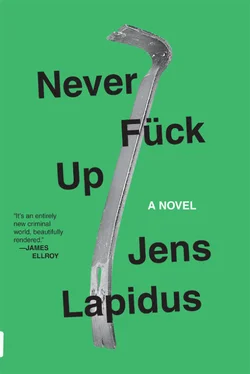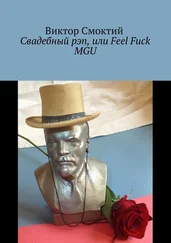Ljunggren poured his ninth cup. Slurped.
Ljunggren had to drive the last hours of the day’s shift alone. Thomas was called to an investigation meeting. Or, as it was formally called, a debriefing. They wanted him to describe his vibes from the early morning of June 3. Give the suits a broader, better, richer story to go on. They needed more than just the technicians’ photos, written reports, and interrogation transcripts.
He was going to headquarters, which is to say, Kronoberg. Which is to say: paradise for detective house mice/paper pushers/little girls. He got a ride with a female cop he’d never met before. Didn’t have the energy to chat. Greeted her politely—after that, they kept their traps shut for the rest of the ride.
Thomas’d written half a page, his incident report. It was bullshit: standard phrases, abbreviations. Off. Andrén and Off. Ljunggren were called at 00.10 hours on the night in question. Arrived at 10 Gösta Ekman Road at 0016 hours. Some members of the general public were gathered outside the building as well as ca. 8 people in the stairwell. A list of times, names of officers that’d arrived on the scene, senior officers, info-reporting, and so on. After that, brief descriptions: Undersigned attempted CPR. CS photographed. Observations: traces of blood and vomit on the walls/floor. VIC, WMA, facedown, severe swelling and wounds. In back pocket: receipts, unidentified slips of paper. BUS on the scene at ca. 0026 hours. SOCO arrived at ca. 0037 hours.
Thomas hated to write incident reports for two reasons. First of all, he couldn’t handle a keyboard. Simple problems tripped him up. He hit the Caps Lock key by accident. Took three minutes to understand what’d happened. He hit the Insert key when he was trying to backspace—every single letter he wrote deleted the text he’d already written. He couldn’t handle that shit. Had a fit. Rewrote half the report from scratch because it was deleted in time with the edits he made. His irritation almost boiled over. Who’d invented those keys, anyway?
Second: It didn’t matter what actually happened. What mattered was that you showed that you’d followed the rules. In reality, he’d skipped doing CPR. But anyone would’ve skipped that part. You have to protect yourself—such is the life of a cop. What made it into the report was another thing altogether.
The main entrance on Polhemsgatan was newly renovated. Gleaming marble floors, polished metal, and huge white designer lamps. Thomas couldn’t believe how they chose to spend their money. Some dudes in the Southern District’d been using the same service weapons for twenty years, but here, at the home of the fancy cops, they spent millions on redoing an entranceway. How exactly did a luxury foyer give Swedish citizens a better city? No end to the fucked-up priorities.
He flashed his badge at the welcome desk. Asked them to call the inspector he was there to see: the head of the preliminary investigation, Martin Hägerström. Room 547. Fifth floor. Odds were: a great view.
On the ride up the elevator was crammed with desk people, mostly women. He didn’t recognize a single face. Did they fill the entire department with girls these days? He fixed his eyes on the elevator buttons—the button with a 5 on it, to be more precise. Adhered to strict Swedish elevator etiquette: get on, sweep your eyes over who’s in there, then fix your gaze on a point on the wall, the control panel, or the inspection certificate. Then keep it there. Don’t move. Don’t turn your head. Don’t look around again. Above all: don’t, under any circumstances, look any of your fellow passengers in the eyes.
Every single button was lit. Someone was getting off at every floor. It was going to be a long ride.
Fifth floor: he found his way to the room. The door was closed. He knocked. Someone called, “Come in.”
Inside: chaos—so messy you could’ve easily hidden a motorcycle in the room. A bookcase along one wall, filled with books, magazines, and binders. Expanding files bursting with paper in piles on the floor. Incident reports, seizure reports, witness contact information, case documents covered the rest of the floor—some in plastic folders, others not. The desk was cluttered with similar stuff: witness-interrogation transcripts, preliminary-investigation memos, and other junk. Coffee cups, half-empty bottles of mineral water, and orange peels everywhere. Chocolates, tobacco tins, and pens in a pile right in front of the computer screen. Somewhere under all that paper, there must be a keyboard. Somewhere in all that mess, there must be a detective inspector.
A thin guy stepped forward. The dude must’ve been standing behind the door.
Extended his hand.
“Welcome. Thomas Andrén, right? Martin Hägerström is my name. Detective inspector.”
“Newly appointed, or what?” Thomas didn’t like his clowny style: the corduroy pants, the green shirt with the top two buttons undone, the chaos in the room, the dude’s messy hair. The un-uniformed ease.
“Not really. I was transferred six months ago, from Internal Affairs. They have so much work piled up here. Needed backup, you know. How are things over where you are? Skärholmen, right?”
Hägerström moved some documents piled on a Myra designer chair. Gestured for Thomas to have a seat. Two words were echoing in his head: Internal Affairs—the rat squad. Martin Hägerström was one of Them. The two-timers, the quislings, the traitors. The ones whose job it was to nail other cops, colleagues, brothers. The unit to which they brought people plucked from other districts in the country so that they wouldn’t have any buddies in the area where they worked. All cops’ number one worry. All normal men’s number one enemy. All hierarchies’ lowest rung.
Thomas met his gaze with a steely look.
“Okay. You’re one of those.”
Hägerström stared back, giving him an even harder look.
“That’s right. I’m one of those.”
Hägerström pulled out a new legal pad and a pen from somewhere.
“This isn’t going to take long. I just want you to tell me briefly what you saw, who you spoke to, how you experienced the situation in the stairwell and the basement the day before yesterday. I have your report and all, but we haven’t finished investigating the crime scene and I’ve only brought in about a third of the people in the area for questioning. We really don’t know for sure if the basement was the actual scene of the crime. Sometimes you need some fleshing out to get a better picture.”
Thomas sat down, too. Looked out through the window.
“What kind of fleshing out do you need? I don’t know anything other than what I wrote in the report.”
The fastest way to avoid lengthy debriefings was usually to refer to the report. Thomas wanted to get out of there. This was a waste of time.
“Let’s start with what happened when you got there. How you discovered the body.”
“Doesn’t it say in the report?”
“It says here that you, and I’m quoting, ‘found the dead person in the basement, outside storage unit number fourteen.’ That’s all.”
“But that’s how it was. On the landing, on the first floor, there was a little family dressed in bathrobes wondering what was going on. They told me he was lying down there. I went down. The door was locked so I opened it with a skeleton key. First thing I saw was blood and vomit on the floor of the basement. Then I saw the body. It was lying facedown. But you’ve got photos of that, don’t you?”
The detective wouldn’t give up. Kept asking for details. What the family in the stairwell’d looked like. How the basement was built. How the body’d been lying. Thomas realized that he’d applied the wrong tactic—he should’ve been more detailed to begin with. This was taking all fucking night. After an hour of questioning, Hägerström stood up.
Читать дальше












